Unsure whether you can meet your nutritional needs as a vegan? Find all essential plant-based protein facts and the best vegan protein sources in this article.
As a vegan, you can feel bombarded with questions like “where do you get your protein?” But this concern about plant-based protein is really misplaced.
Although this macronutrient is undoubtedly essential and plays many vital roles in our bodily functions, we don’t need massive quantities of it.
Plus, there are always delicious high-protein vegan desserts or quick vegan protein breakfasts!
We’ve already covered essential nutrition tips in our vegan food pyramid and wrote about soy on a vegan diet in particular, but plant-based protein deserves its own article!
Find out which foods contain protein, whether they need to be combined to create “complete protein,” if you can build muscle as a vegan, if you need to focus on any particular foods, and what your daily protein requirements are.
Don’t miss out on our favorite high-protein recipes, and vegan protein sources chart, and be sure to check out our articles on weight gain as a vegan as well as plant-based weight loss.
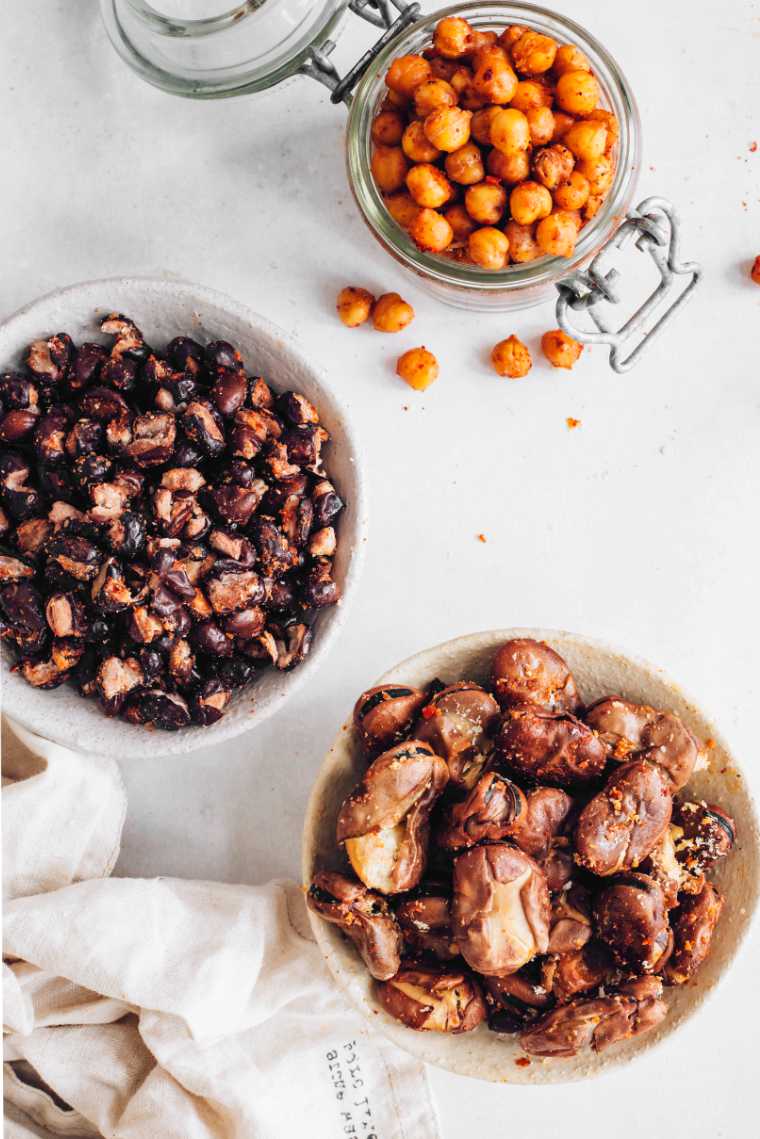
Vegan protein facts & FAQs
What exactly is protein & why do we need it?
We need protein for our muscles, bones, hormones, immune system, digestive enzymes, nutrient absorption and to rebuild and replenish all kinds of cells.
Protein consists of 20 amino acids, some of which we can synthesize ourselves while 9 of them are “essential” — meaning we need to get them from our diet.
If you don’t get enough protein, you can lose muscle mass which can lead to increased falls, injuries or hospitalizations. While overt protein deficiencies are rare, even a suboptimal status can take a toll on our health!
Benefits of plant-based protein
There are many benefits of plant-based protein including increased fiber intake, lower risk of heart disease and easier weight management.
Most plant-based protein sources are lower in saturated fat and free from cholesterol compared to meat and dairy which makes a huge difference!
There are also benefits for the environment, plus you don’t support animal agriculture which is responsible for the suffering and slaughter of billions of land animals each year.
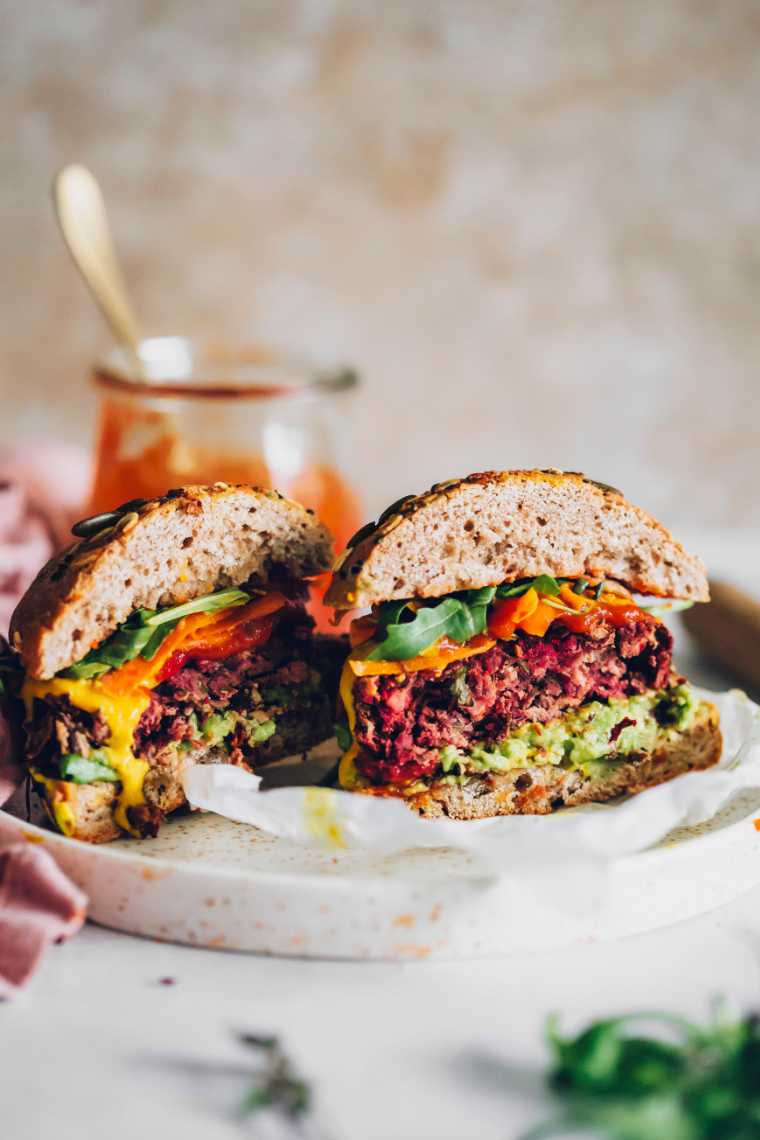
What are complete proteins?
The term “complete protein” refers to foods or combinations of different foods that contain all essential amino acids and stems from a study that was conducted over a century ago.
It is an old myth that you need to eat grains and beans at the same time to produce a complete amino acid pattern that mimics human body protein — this has turned out to be unnecessary!
Our bodies maintain a reserve pool of different amino acids from various sources for later use, which means we can do our own “complementing.” Plus, all plant-based foods contain all nine essential amino acids — just in varying amounts.
Lysine on a vegan diet
Let’s take a closer look at one specific essential amino acid called “lysine.” While there are good sources of lysine in the plant kingdom, it’s hard to meet requirements if you don’t include legumes, quinoa or seitan into your diet!
So, if you were to meet all of your protein needs by eating primarily grains and veggies, you could still fall short of this one amino acid!
Therefore, it is recommended to eat 2-3 servings of legumes per day. One serving can look like this:
- 1 cup soy milk
- 2 tbsp peanut butter
- ½ cup tofu or tempeh
- 2-3 oz soy-based mock meat
- ½ cup cooked beans or lentils
How much protein do you need per day as a vegan?
Everyone’s protein requirements are a bit different and need to be calculated first. For adults over 19, the dietary reference intake is 0.8 grams per kilogram of body weight.
It’s important to know that the term “body weight” refers to lean body mass, meaning that overweight individuals need to calculate their protein requirements using the healthy weight range for their height.
Since plant-based protein cannot be as easily digested as animal protein, it is recommended that vegans eat a little extra protein.
It’s just a small difference, though: a 150-pound non-vegan would need about 54 grams of protein, whereas a vegan would require about 60 grams per day.
If you’re highly active, your protein needs range from 1.2 to 1.7 grams per kilogram of body weight!
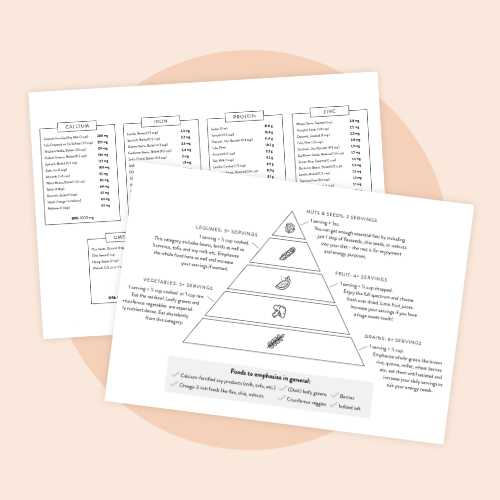
download our free vegan nutrition printables
Grab your free PDF and sign up for our newsletter by entering your email below!
Protein on a wfpb diet
As per definition, a whole food plant-based diet doesn’t include many processed foods like seitan and plant-based protein powder.
To meet your protein requirements on a wfpb diet, you should eat plenty of beans, lentils, quinoa and peanuts every day.
We’d also suggest that you include as many soy-based foods as possible, such as tofu, tempeh or soy milk, into your diet!
However, you don’t need to stick to 100% whole foods on a healthy plant-based diet and can enjoy seitan etc. on a regular basis.
Do I need to take protein powder as a vegan?
No, you can meet your protein requirements by eating vegan foods like beans, legumes, soy products, grains, nuts and seeds.
If you want to, you can add vegan protein powder to your diet — this can be especially helpful if you can’t digest beans and lentils very well or don’t like the taste of these foods at all.
Check out our list of the best vegan protein sources below!
Can you eat too much plant protein?
As with everything in life, it is possible to overdo it. Even though plant-based protein is healthier than animal-based protein, if you eat more than 2 grams per kilogram of body weight per day, research suggests that this can cause long-term health problems.
Symptoms of eating too much protein include intestinal discomfort, dehydration and nausea. The overconsumption of protein can increase a person’s risk of developing diabetes or osteoporosis!
However, these findings were mainly associated with animal-based protein and haven’t been studied for vegan protein alone.
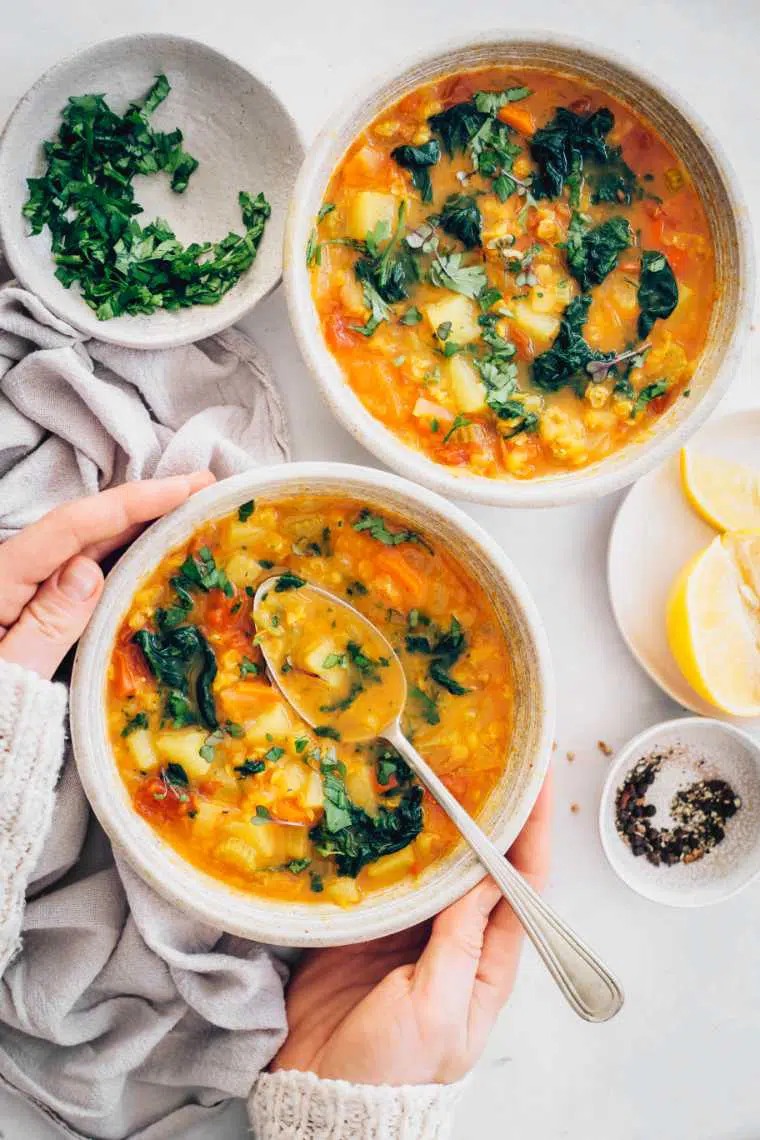
Vegan protein sources
Eating enough calories per day on a varied plant-based diet is the first vital step to ensure adequate protein intake.
Try to include plenty of legumes into your diet and check out the following vegan protein food lists to see which are higher in protein than others!
Top 12 vegan protein foods
- Seitan
- Tofu
- Tempeh
- Lentils
- Beans
- Textured Vegetable Protein (TVP)
- Chia & hemp seeds
- Soy milk
- Quinoa
- Nutritional yeast
- Green peas
- Almonds
Let’s go into more detail and check out each plant-based food group to see the best protein sources.
Beans & legumes
- Chickpeas 11.6 g per 1 cup
- Lentils 18 g per 1 cup
- Cannellini beans 9.7 g per 1 cup
- Kidney beans & black beans 8 g per 1 cup
- Peanuts 11.5 g per ⅓ cup
Numbers refer to cooked food.
Soy & mock meat
- Tempeh 15.4 g per ½ cup
- Tofu, firm 10.2 g per ½ cup
- Seitan 31 g per 3 oz
- Soy milk 9.2 g per 1 cup
- Edamame 8.4 g per ½ cup
Nuts & seeds
- Hemp seeds 9.9 g per ¼ cup
- Pumpkin seeds 8.8 g per ¼ cup
- Almonds 7.6 g per ¼ cup
- Chia seeds 6.6 g per ¼ cup
- Pistachios 6.4 g per ¼ cup
- Sunflower seeds 6.2 g per ¼ cup
Grains
- Amaranth 9.3 g per 1 cup
- Spelt, cooked 10.7 g per 1 cup
- Quinoa, cooked 8.1 g per 1 cup
- Pasta, whole wheat 7.5 g per 1 cup
- Bread, whole wheat 7.3 g per 2 slices
- Oatmeal, cooked 5.9 g per 1 cup
- Brown rice, cooked 5.5 g per 1 cup
Veggies
- Green peas, cooked 8.2 g per 1 cup
- Brussels sprouts 5.7 g per 1 cup
- Spinach, cooked 5.3 g per 1 cup
- Potato, medium 4.3 g
- Avocado, medium 4 g
- Broccoli 3.6 g per 1 cup
- Mushrooms, cooked 3.4 g per 1 cup
Vegan Protein Sources Chart

Plant-based protein recipes
Here are our favorite high-protein vegan recipes that include many of the foods listed above.
More protein-packed goodness
These recipe collections feature high-protein plant-based ingredients.
Have you been worried about getting enough protein and which are your favorite sources? Let us know in the comments below, share this article with your friends and be sure to Pin it here!

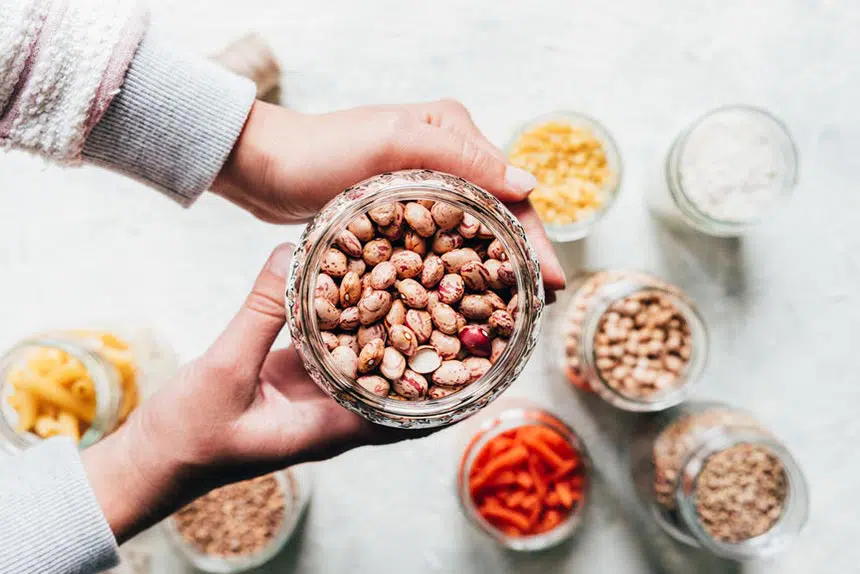
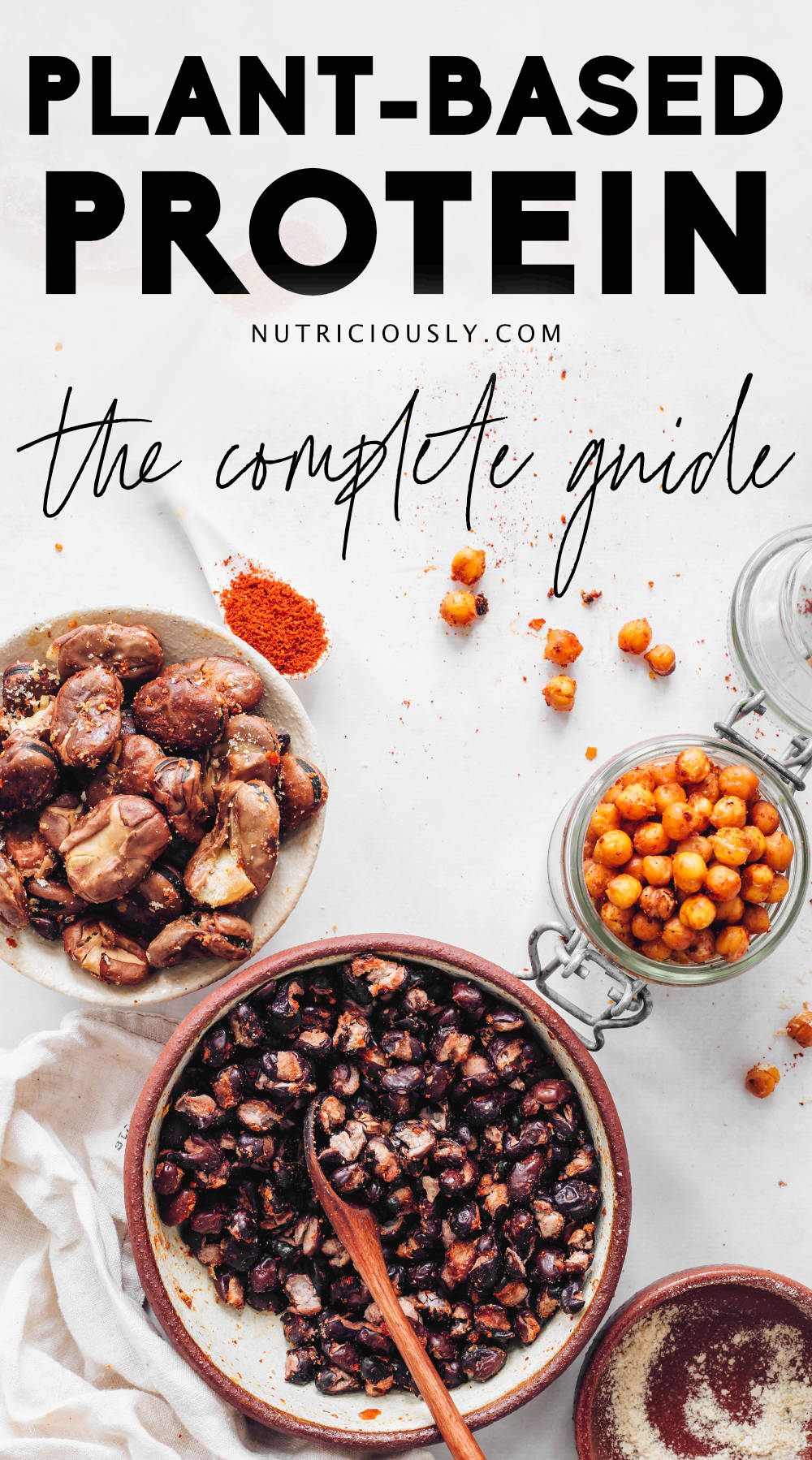
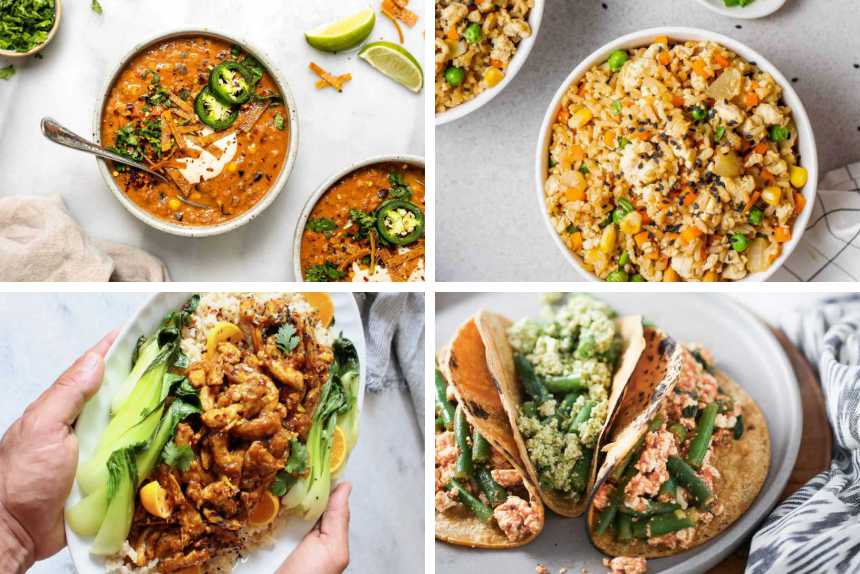
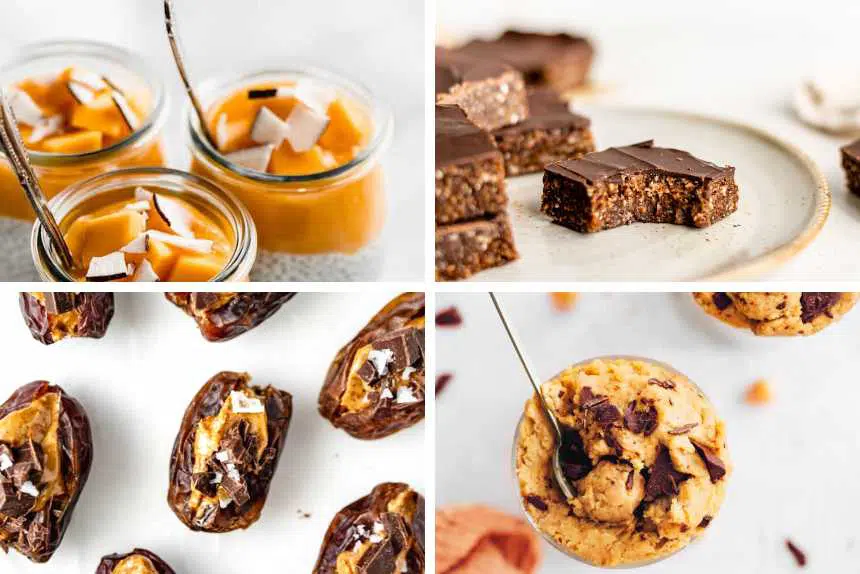
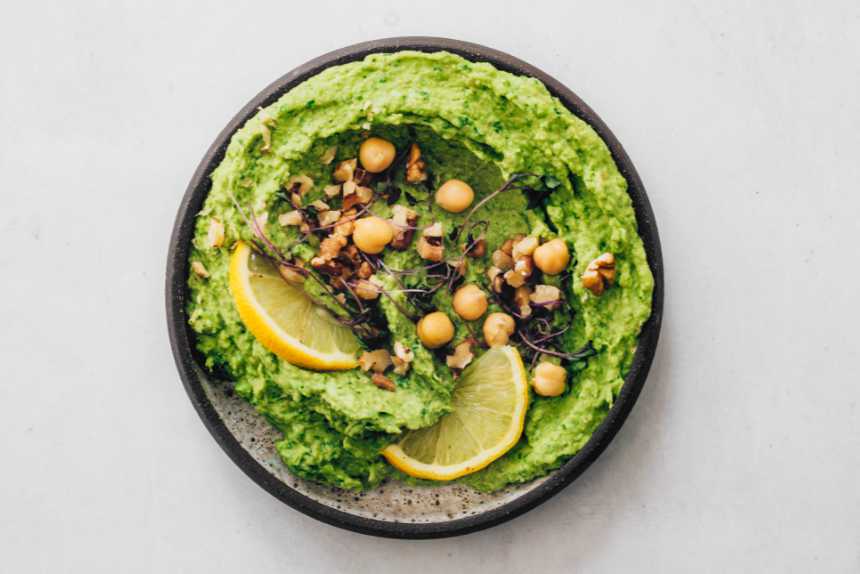
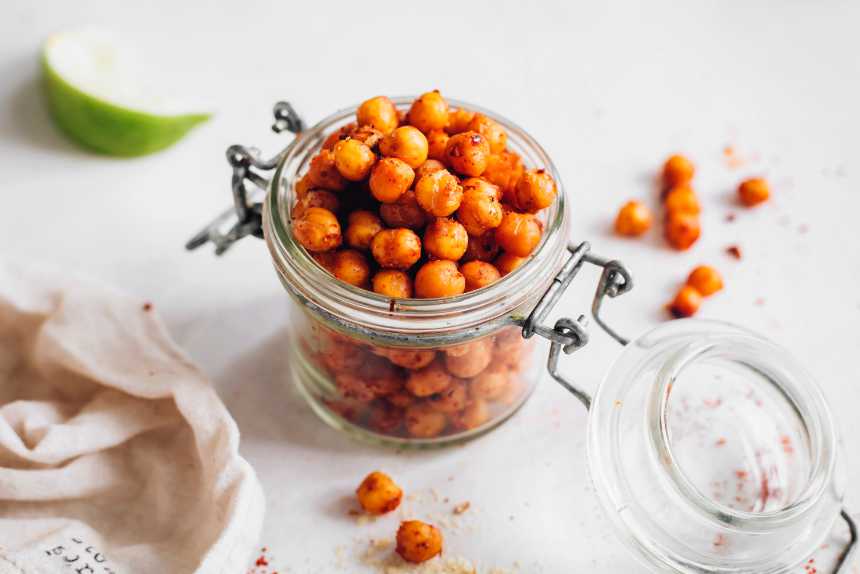
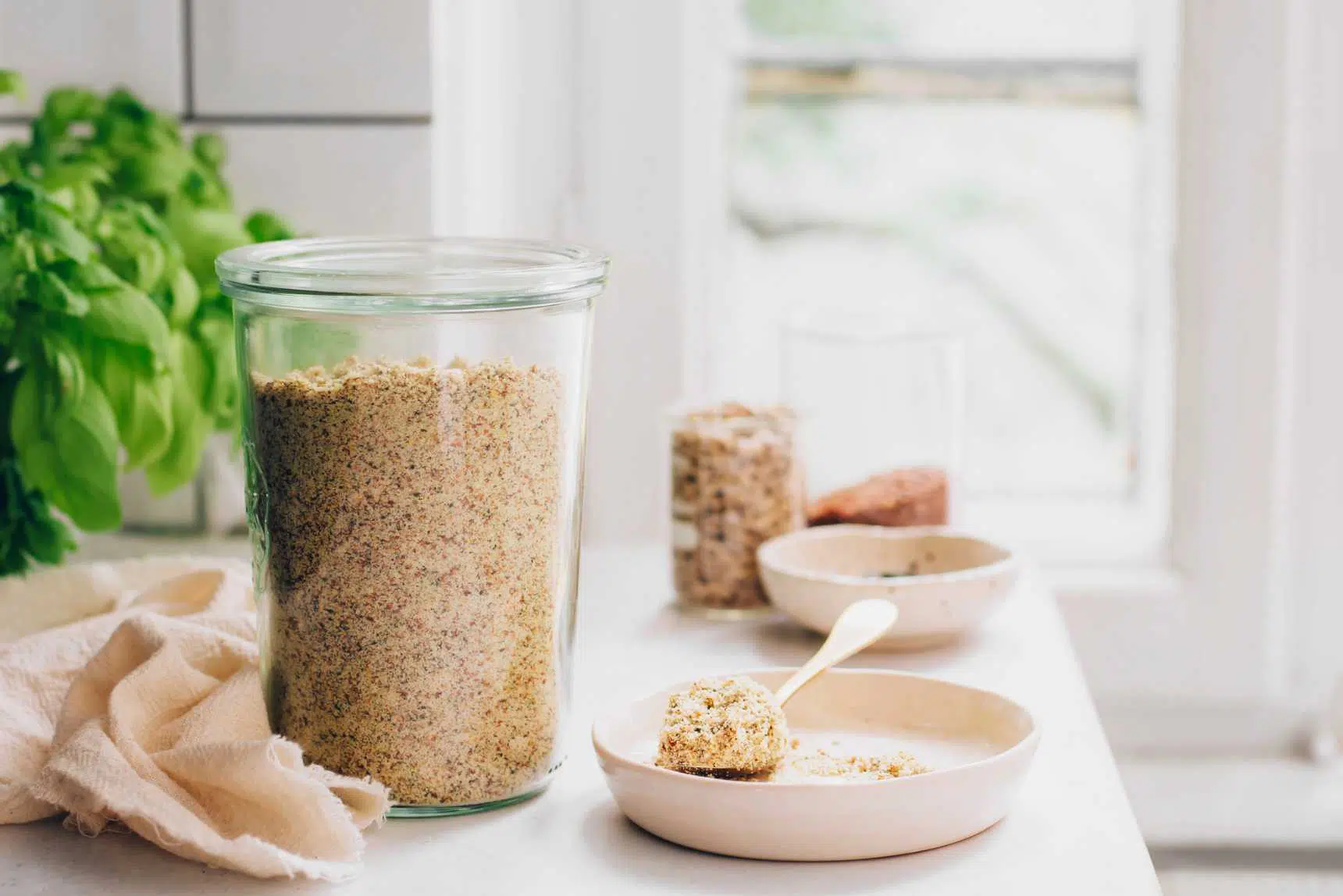
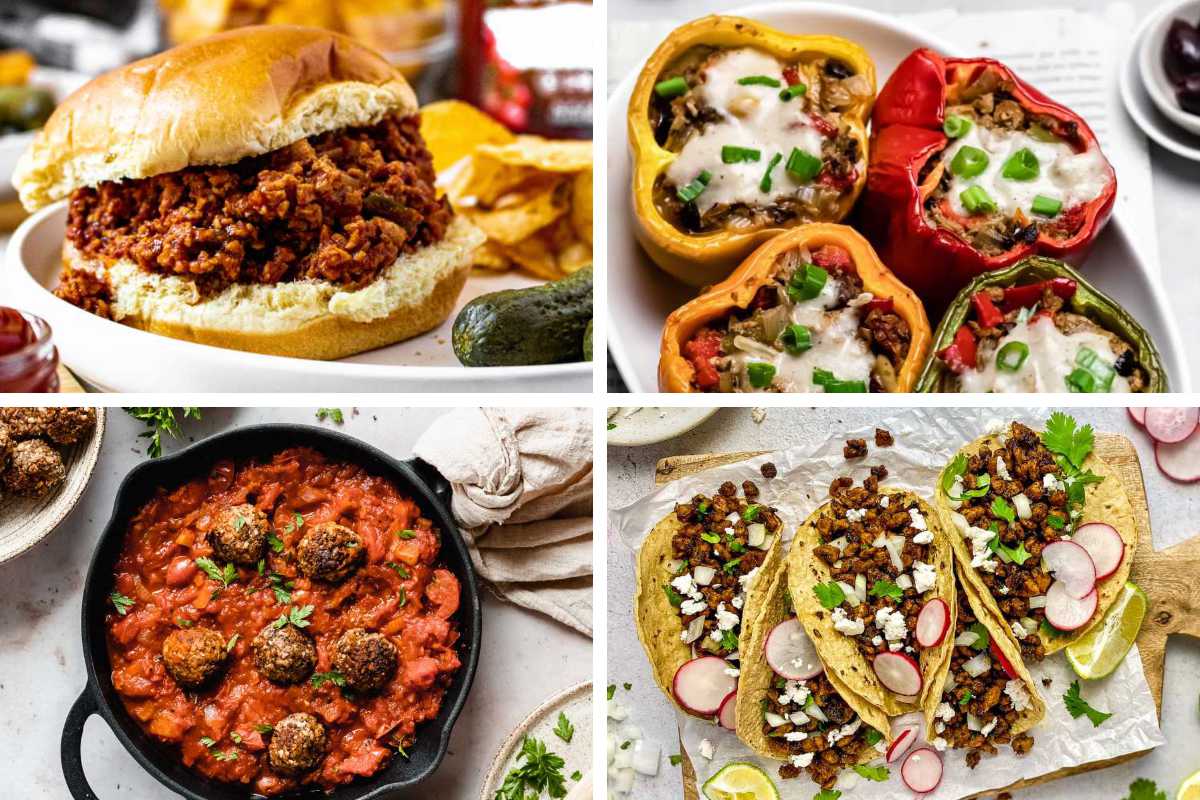
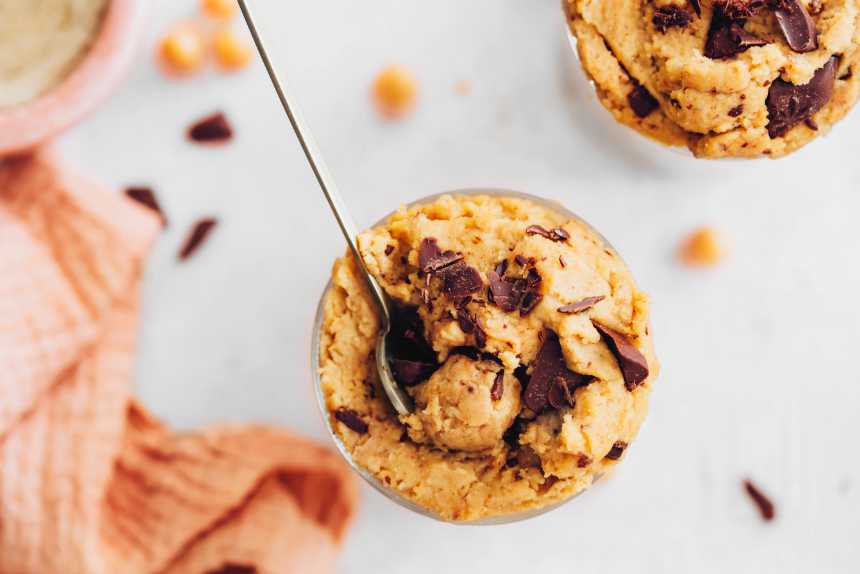
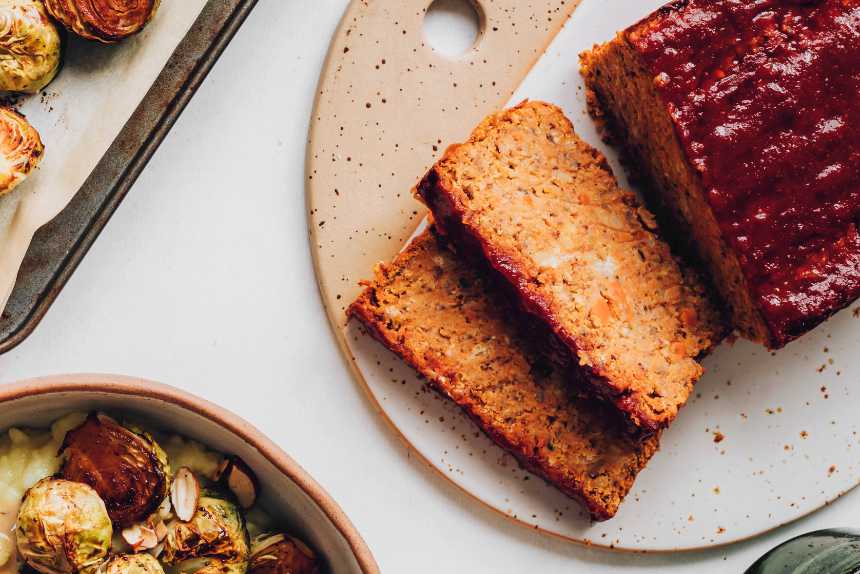
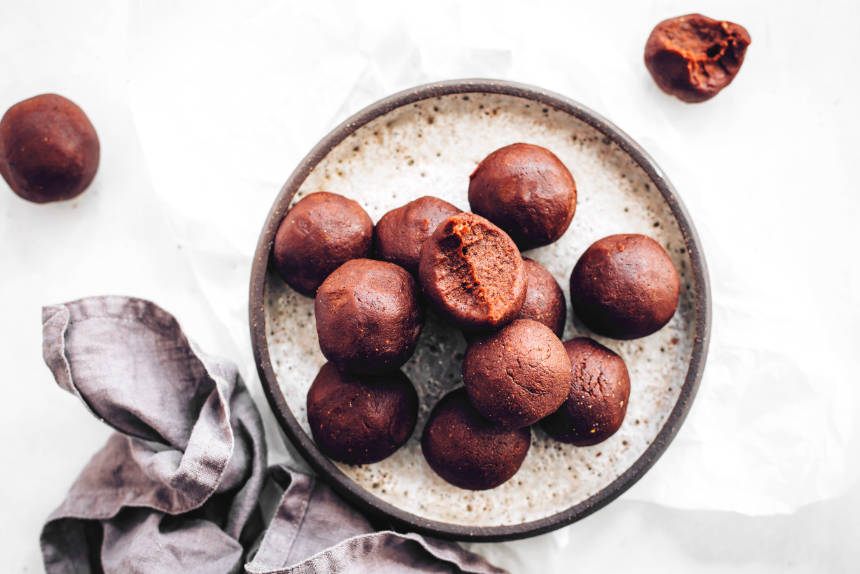
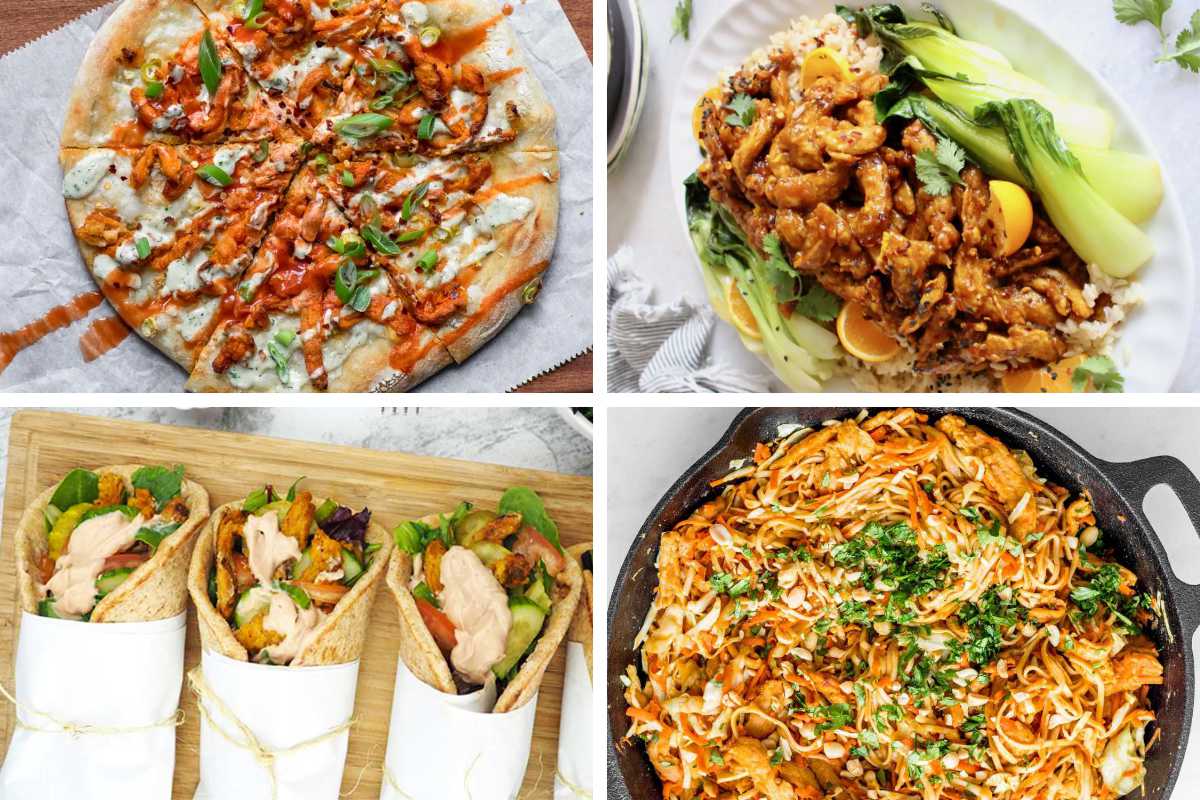
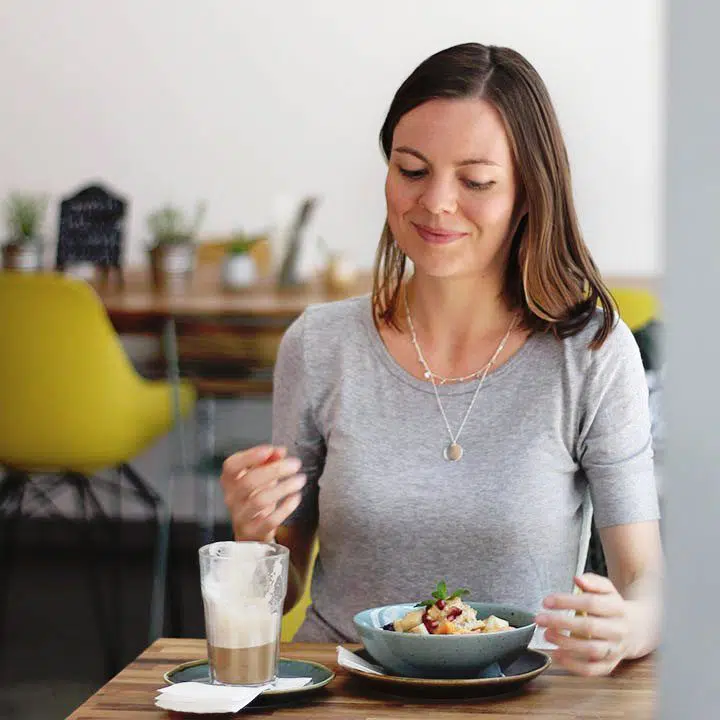
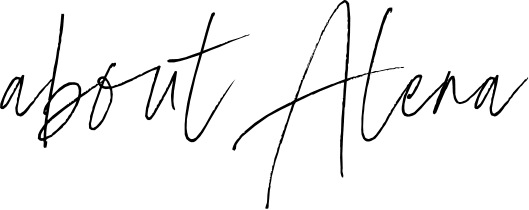 Alena Schowalter is a Certified Vegan Nutritionist who has been a vegetarian since childhood and vegan since 2012. Together with her husband, she founded nutriciously in 2015 and has been guiding thousands of people through different transition stages towards a healthy plant-based diet. She’s received training in the fields of nutrition, music therapy and social work. Alena enjoys discussions around vegan ethics, walks through nature and creating new recipes.
Alena Schowalter is a Certified Vegan Nutritionist who has been a vegetarian since childhood and vegan since 2012. Together with her husband, she founded nutriciously in 2015 and has been guiding thousands of people through different transition stages towards a healthy plant-based diet. She’s received training in the fields of nutrition, music therapy and social work. Alena enjoys discussions around vegan ethics, walks through nature and creating new recipes.
this is SOOOOO timely! Thank you for the article in an easy-to-understand outline. I just had this conversation with a vegetarian friend who (seems) to be under the impression that cheese is her safe-guard for her daily protein. I wanted to ask though, your stats are different than what I was trying to discover for her online (http://nutritiondata.self.com/facts/legumes-and-legume-products/4326/2)
Based on this website, I’m sharing that almost a day’s worth of protein is in a cup of beans. Your sources are significantly less.
I’m asking because I’d love to know. Thanks again for your article. I will be sharing for sure.
Hey Nanci,
glad the article found you well. :)
Relying on cheese as a protein source is definitely not the best idea as you’re getting tons of saturated fat and cholesterol along the way.
Oh, you are right about the chickpeas data. It was supposed to say “1/2 cup” and not “1 cup” on our infographic. So it’s 7.3 g for 1/2 cup and 14.6 g for 1 cup.
I fixed that. Other than that, I think everything should be alright. It might be a bit confusing, because we used relatively small serving sizes which, in turn, results in smaller amounts of protein.
But please let me know if anything is still unclear to you!
This is a good read, thank you for putting it out there and answering questions that many of us have. Friends give me a hard time because they think since I am a vegetarian I am not getting all the amino acids but I know they have never even looked into it
Hey Bridget,
thanks for your feedback! We need to work hard on busting the protein myths here. The Western world is oversaturated when it comes to this nutrient, causing more harm than good. I know that many people fear for your health when they hear you’re plant-based/vegan but at the same time don’t even know anyone who suffered from a legitimate protein deficiency. More to come on the blog!
All my best x
Hey guys, Adele here! So lovely to see that this article is really helping people defend their ethical food choices and hopefully put to rest any concerns you may have.
Once I stopped worrying about protein intake and just more in having a varied, healthy diet, I actually started to enjoy veganism so much more and got in much better shape. Ironic! Thanks for checking it out and sharing :)
Thank you for this article, it nicely explains probably the most common question for vegans – protein. In the end, you know your body best, and well-balanced plant-based diet can provide you with all the nutrients you need (I wrote about protein sources: https://vegancookbook.com/vegan-protein-sources/). All it takes is a little planning and time for your body to adjust to the change. It is true that we are so often worried about making the wrong step that we forget to enjoy all the new exciting opportunities and recipes that plant-based diet has to offer.
Funny enough how suddenly people turn into nutritionists and worry about protein when you mention that you don’t eat any animal products. In reality, we should be way more concerned for them who eat meat, fish, dairy and eggs! These are a lot more harmful than getting your protein from beans and grains ;) Not really that complicated.
Thank you for all this incredible information. I’m teaching a food class to High school students. Would love to challenge them to trying to this lifestyle for a week.
Sounds amazing! Thank you so much for this positive feedback. Has this happened already?
Feel free to let them know about our free online course (http://nutriciously.com/course/) or the Challenge22
https://www.challenge22.com/challenge22/ :)
I’m having a difficult time figuring out breakfast. I am not really an oatmeal fan although I’ve given it plenty of opportunities. I was researching plant-based protein powders, but after reading your article I am unsure. I need something to keep me full until after my lunch-time workouts. So a banana and almonds aren’t really going to do it (I eat those as a snack before my workout). Thanks for any suggestions!
Breakfast ideas:
Smoothie bowl
Whole grain bread with avocado or hummus or nut butters and either fruit or veg
Tofu scramble
Granola
Banana pancakes (possible with oat flour)
Sandwiches
Blueberry muffins http://nutriciously.com/vegan-blueberry-muffins/
Hash browns
Chia pudding with fruit
Rice pudding with fruit
Oatbars / granola bars http://nutriciously.com/vegan-oat-bar-recipe/
Essential amino acids do not cause cancer!!! What are you talking about? Pull your fucking head out of you ass please!!!!!
https://www.sciencedaily.com/releases/2016/08/160801113654.htm
https://www.scientificamerican.com/article/diet-high-in-meat-proteins-raises-cancer-risk-for-middle-aged-people/
Campbell TC. Dietary protein, growth factors, and cancer. Am J Clin Nutr. 2007;85(6):1667.
Ornish D, Weidner G, Fair WR, et al. Intensive lifestyle changes may affect the progression of prostate cancer. J Urol. 2005;174(3):1065-1069.
Kleinberg DL, Wood TL, Furth PA, Lee AV. Growth hormone and insulin-like growth factor-I in the transition from normal mammary development to preneoplastic mammary lesions. Endocr Rev. 2009;30(1):51-74.
Allen NE, Appleby PN, Davey GK, Kaaks R, Rinaldi S, Key TJ. The associations of diet with serum insulin-like growth factor I and its main binding proteins in 292 women meat-eaters, vegetarians, and vegans. Cancer Epidemiol Biomarkers Prev. 2002; 1(11):1441-1448.
McCarty MF. Vegan proteins may reduce risk of cancer, obesity, and cardiovascular disease by promoting increased glucagon activity. Med Hypotheses. 1999;53(6):459-485.
Cheers!
I had a gastric by-pass two years ago. I eat about anywhere from 600 to 700 calories a day. I am a healthy thriving adult female-age 50. I make sure that everything I eat has nutrient dense foods. I make sure that every bite of food I put in n my mouth has protein in it along with some kind of positive nutrients(vitamins/minerals) in it. I get about 45 grams of protein a day and use NO protein powders! It in s very doable on a vegan diet.
Thanks for the article.
I’m from Brazil and a regularly go to the gym. There are many people often talk about getting protein eatting meat, chicken, protein shake (like whey protein) and when you tell you are searching for plant proteins everybody said that you are wrong.
Here are a lot of types of fruits and vegetables! It´s very easy and cheap to be a vegetarian or vegan here.
you don’t need protein. if you just eat according to your hunger, you’ll naturally get enough protein. see the body reacts to stress on a daily basis and our hunger reflects those changes in the brain. sometimes we need to binge on carbs like eating a box of pasta and sometimes we need lots of protein like eating taco bell bean burritos. the key is to eat what you like and then get active like lifting some dumbbells. i don’t recommend too much cardio like running on the treadmill. rather a slow 15 minute walk on the treadmill is enough, and that too not every day. they key thing is that we want to normalize our diet and balance it between high fat and low fat days. i learned some of these concepts from the 2 books “fit for life” and “fitness without exercise”. but make sure not to diet and eat well in abundance because our brain waves need to be normal and not stressed. at the same time we can do some “exercise” in the form of eating steamed foods in our diet and reducing oil. that is also very healthy and more healthy than cardiovascular exercise (running).
But many myths still surround the health implications of a vegetarian diet. Learn the facts when it comes to plant-based diets. As meat has become synonymous with protein, many consumers struggle to identify non-meat sources of this dietary building block. But adequate protein needs easily are attained through a well-planned diet. And plant-based protein typically contains more fiber and less saturated fat, factors that are cornerstones of a heart-healthy diet. There are many versatile plant-based sources of protein that fit into a healthy eating plan: legumes (beans, lentils, peas and peanuts), soy products, whole grains, nuts, seeds and (for lacto-ovo vegetarians) low-fat or fat-free dairy and eggs.
Congrats guys, and a huge thank you for this website.
Ideas had been building in my mind for years around sustainability, ethics and health, but only when I came across serious doctors, data and studies, my mind clicked and I became WFPB.
For the first time in my life I do not feel like I have to accept things and I can actually do something to change them.
It took me a while to explore and research all WFPB related materials I could find, trying to be thorough and answer all the questions, and I can say this website is one of the most compelling, complete and useful resources that I have seen, specially to guide further research.
Only request/advice: it would be AMAZING to have contents available in other languages. It would really help to spread the word and I am finding it really challenging to find materials I can share with my people back home.
Other than that, THANK YOU!
I like your site; it is encouraging.
I like to learn all I can about healthy foods — and have since I was a child, and especially now that I have had a chronic illness for 4 + years.
I also like the World’s Healthiest Foods site. One of my questions is how to get enough betaine and choline (both glycine forms — betaine is tri methylated; choline is quatra methylated.) I tend to focus on plants, herbs, weeds that increase my glutathione. Since glycine (and betaine and choline) glutamine and cysteine help the liver make glutathione, I want to make sure I am getting enough. According to the WHF’s site, I would need to eat about 2 cups grains, 2 cups beans, up to a cup nuts/seeds to get that and enough protein (at least from my reading of it.) I am working up to eating more — but I focus on green juicess (from weeds, medicinal plants, and leafy greens.
What would you recommend in to have enough quantity of choline and betaine? I put some organic sunflower lecithin for the choline and I eat beets. I eat from the legume and allium families for glutathione support. (and more too.)
Thanks for your time!